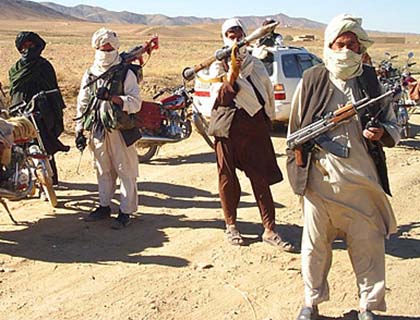In the wake of the deadly Taliban battle between Taliban fighters and Afghan security forces in Jalriz district of Maidan Wardak province, there have been growing public and political pressures on the government and the security agencies to appropriately investigate the incident and clarify the reasons behind the apparent negligence over the issue. Many high-level government officials, analysts and MPs have raised questions whether there have been some sorts of conspiracy behind the incident and collusion with the Taliban that led to the carnage which left around 27 local police forces killed. The lack of action from the Afghan security agencies have been widely criticized by the public, the media, and top political figures, some even suggesting possibility of betrayal from fellow security forces serving in the district and the Afghan security agencies.
A number of high-profile political figures and officials of the National Unity Government, including Haji Mohammad Mohaqiq, the Second Deputy of the Chief Executive Officer and Sarwar Danish, the Second Vice President, have severely criticized Afghan security agencies and top security officials for negligence and apparent lack of action to help the embattled security forces trying to repel the Taliban attack. In a heated parliamentary session, MPs in the Lower House of the parliament, the Mishrano Jirga, decided to shut the house for one day in protest to the deteriorating security and the Jalriz incident. The Speaker of the Mashrano Jirga, Fazl Hadi Muslimyar, explained how police forces fighting the Taliban were not backed up by reinforcement, saying “there was certainly a conspiracy involved with the incident”.
With the related events and reactions unfolding, there is now more information being released regarding how the battle in Jariz district developed and how the Afghan security agencies failed to send reinforcement in time. It is said that local police forces were left alone in the face a large-scale Taliban attack and their request for support had gone ignored by local authorities and the security agencies in the center. There are reports by local media that all attempts from the embattled police forces to contact and request for help have been ignored or diverted with false information.
The apparent lack of action and perceivable betrayal from local and central security officials has created a lot of ambiguities around the incident. It is widely believed that a range of individuals and agencies are implicated in the apparent lack of action and betrayal from local and security authorities. Shortly after the incident took place, Haji Mohammad Mohaqiq raised serious questions in a blunt way, saying why only check posts belonging to Hazara police forces were attacked, why other police forces in the area avoided to help the embattled Hazara local police soldiers, why the Taliban assault ended only when all Hazara police forces were killed.
The events related to the battle and the death of the soldiers raised serious questions over the leadership and management of the war efforts against the Taliban. In several cases, Afghan forces serving in remote posts and in volatile provinces have been left alone in face of ferocious attacks from the insurgent groups, resulting to high casualties on the Afghan army and police forces. The incidents suggest the major gap existing in the security agencies to efficiently lead the war efforts and provide timely reinforcement when needed. Afghan military lack the ability to efficiently support and reinforce the army and police units fighting in remote areas of volatile and precarious provinces. However, what makes the Jalriz incident unique is that the local police forces trying to repel the Taliban attack did not receive back-up and reinforcement while it was quite possible for local authorities and central agencies to provide the required help within hours.
President Ashraf Ghani has established a fact-finding commission to investigate the incident and report to the government. Establishing a commission is the least the National Unity Government can do to address the public skepticisms and widespread suspicions over performance of local authorities and central agencies before and during the attack in Jalriz. There are now widespread suspicions that the apparent lack of action from local authorities and central security agencies may not be sufficiently investigated and addressed by the government. The commission should be able to find the answers for the systemic failures and the apparent betrayal from all related security agencies and the provincial authorities to provide reinforcement to the forces fighting the Taliban for hours.
The incident in Jalriz also led many to conclude that the Afghan security agencies failed to provide support for the embattled soldiers because of the rifts existing in the ranks of the Afghan security forces around ethnic lines. The Afghan military has usually been praised for its capability to fight the insurgent groups. However, incidents like the Jalriz attack highlight the need for more cohesion and integrity in the ranks of the army and police forces. The systemic failure of the security agencies and provincial authorities in the Jalriz incident showed how Afghan security agencies are vulnerable to arbitrary actions from government authorities and political players.
The incident with its controversial aftermaths is further increasing public disappointment of the government in security matters. Such attacks discriminately targeting members of specific ethnic groups will exacerbate the hidden conflict and tensions among ethnic groups at a time when Afghanistan needs national and inter-ethnic harmony and unity. The leaders of the national unity government need to realize that enter-ethnic differences and distrusts could potentially result to and expedite political disintegration.
The attack in Jalriz province once again showed how residents of central provinces are vulnerable to the growing insecurity and the resurgent of the Taliban and other militant groups. The people need to consider local resistance and protection units against the militant groups who are attempting to increase their activities in vulnerable areas like the Northern and central provinces. Jihadi and key political leaders will also need to consider helping formation of local resistance groups to protect the people against the Taliban and other militant groups.

